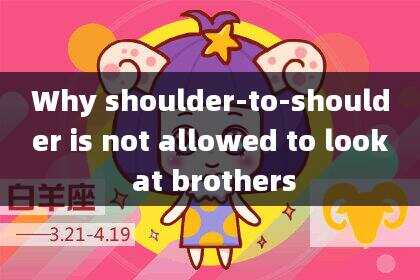
Chinese idiom is a treasure trove of wisdom, reflecting the culture and philosophy of the Chinese nation. Among them, the idiom "why shoulder-to-shoulder is not allowed to look at brothers" is a vivid reflection of the traditional Chinese moral code and has a profound cultural connotation. This article will explore the origin and meaning of this idiom, as well as its relevance in today's society.
The idiom "why shoulder-to-shoulder is not allowed to look at brothers" originated from the ancient Chinese story of two brothers, who were very close and supportive of each other. However, the story took a tragic turn when one brother, out of jealousy, betrayed the other. This betrayal led to a series of misfortunes and ultimately resulted in the downfall of the entire family. From this story, the idiom conveys the moral lesson that even close relationships can be undermined by envy and betrayal.
In today's society, the idiom "why shoulder-to-shoulder is not allowed to look at brothers" still holds significance. It serves as a warning against jealousy, greed, and disloyalty in interpersonal relationships. The idiom reminds us to cherish and value the trust and support of our friends and family, and to guard against negative emotions that could lead to the breakdown of these relationships.
Moreover, the idiom also reflects the importance of integrity and moral values in maintaining harmonious relationships. In a world where personal gain and competition often take precedence, the idiom serves as a reminder that true happiness and success come from genuine relationships and mutual support, rather than from exploiting and betraying others.
In conclusion, the idiom "why shoulder-to-shoulder is not allowed to look at brothers" not only carries a profound historical and cultural significance, but also imparts valuable moral lessons that are still relevant today. It serves as a timeless reminder of the importance of trust, loyalty, and integrity in maintaining strong and meaningful relationships. By heeding the wisdom of this idiom, we can navigate the complexities of human interactions with grace and empathy, and build a society based on mutual respect and trust.
版权声明:xxxxxxxxx;


工作时间:8:00-18:00
客服电话
电子邮件
admin@qq.com
扫码二维码
获取最新动态
